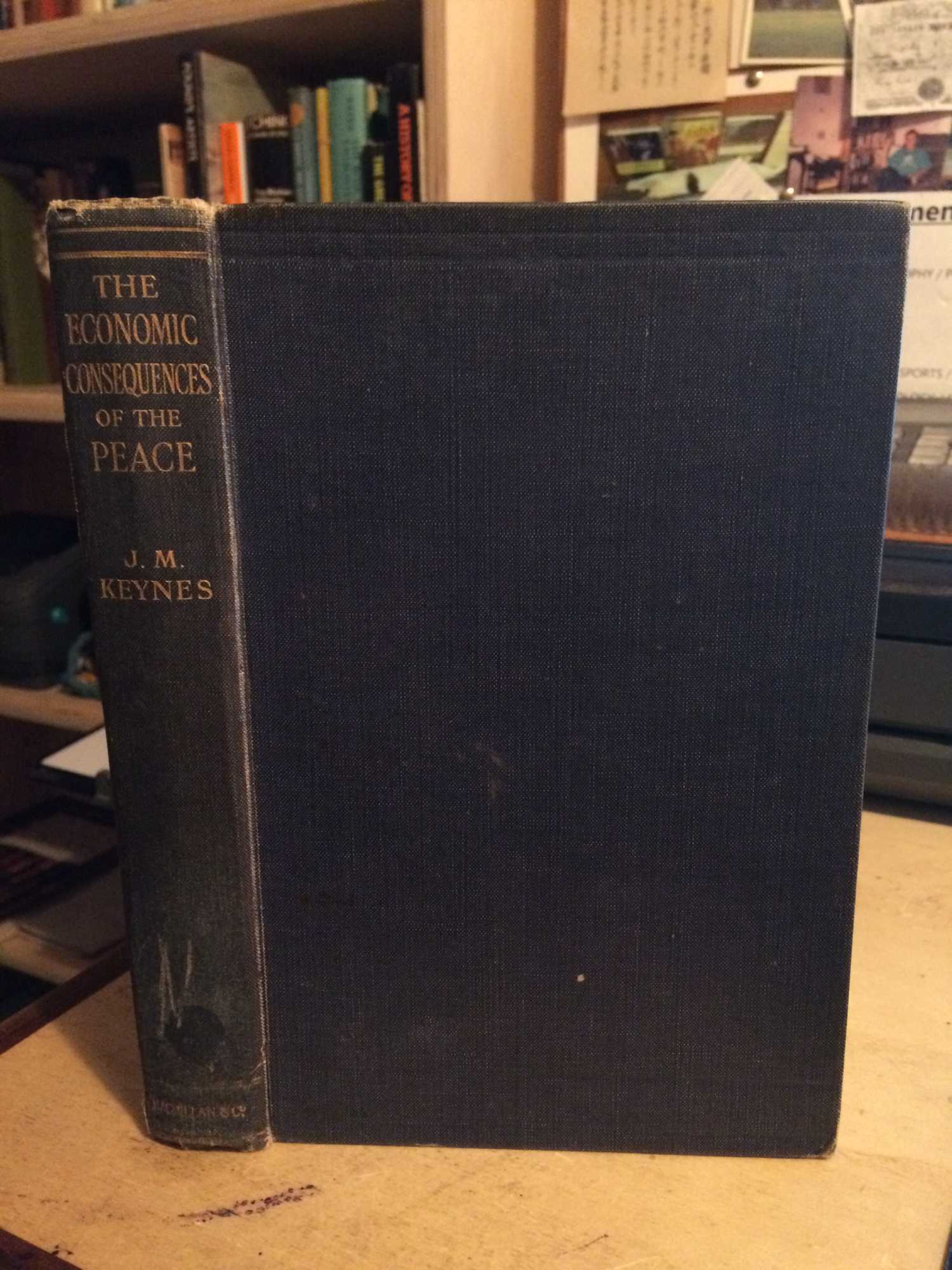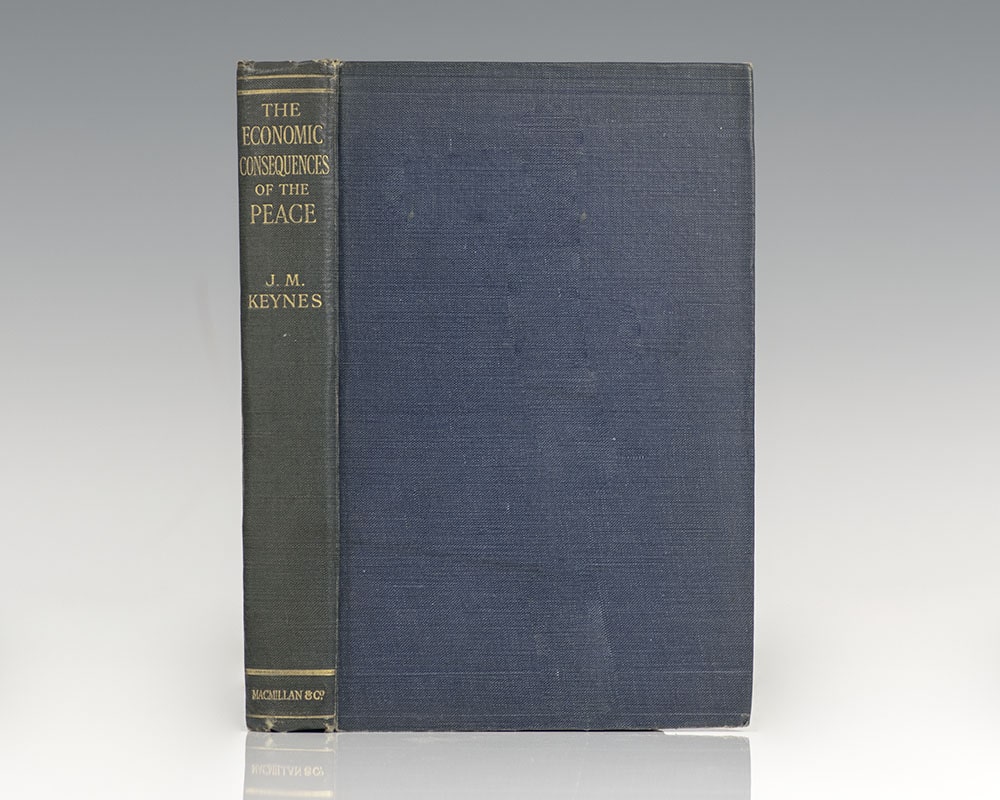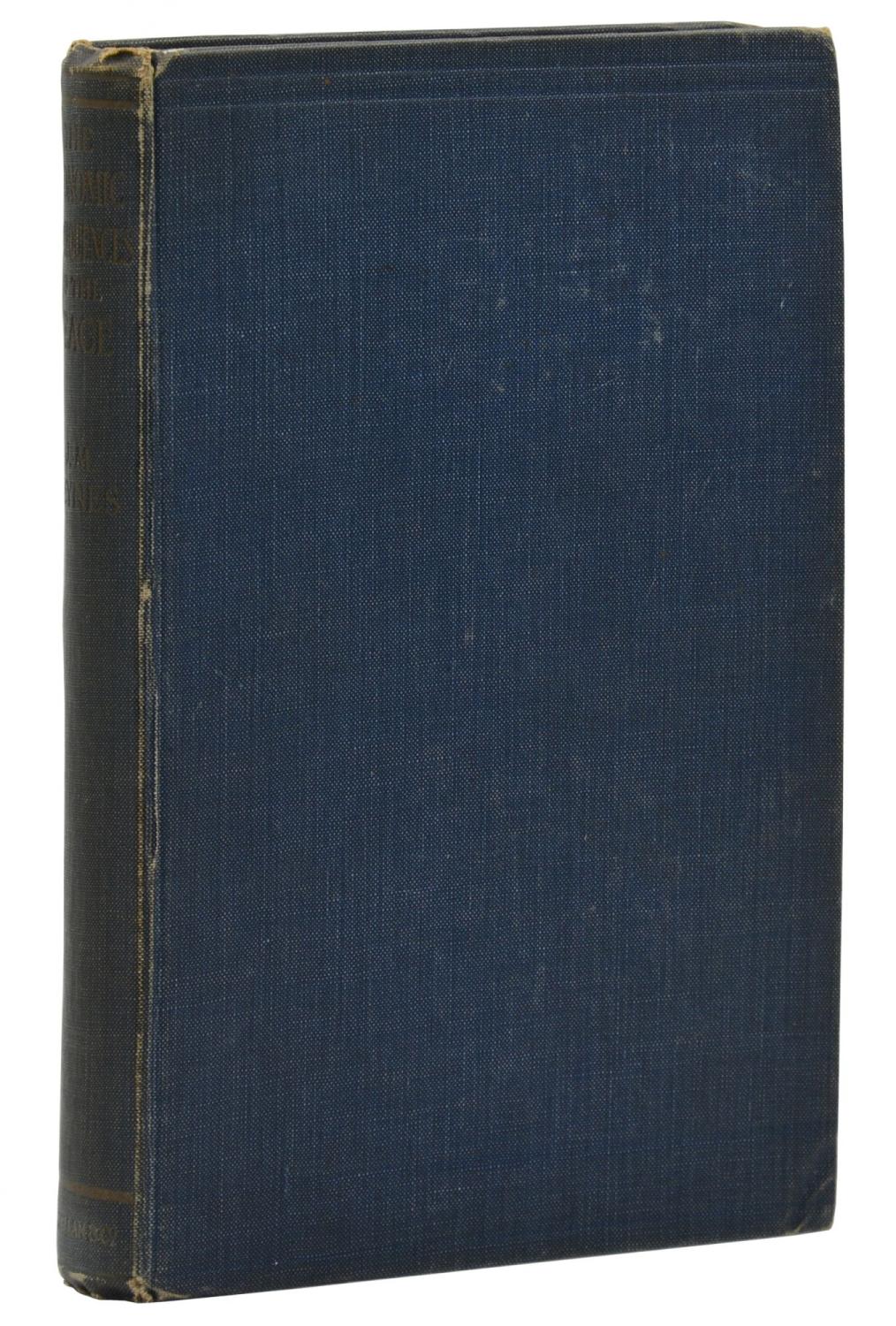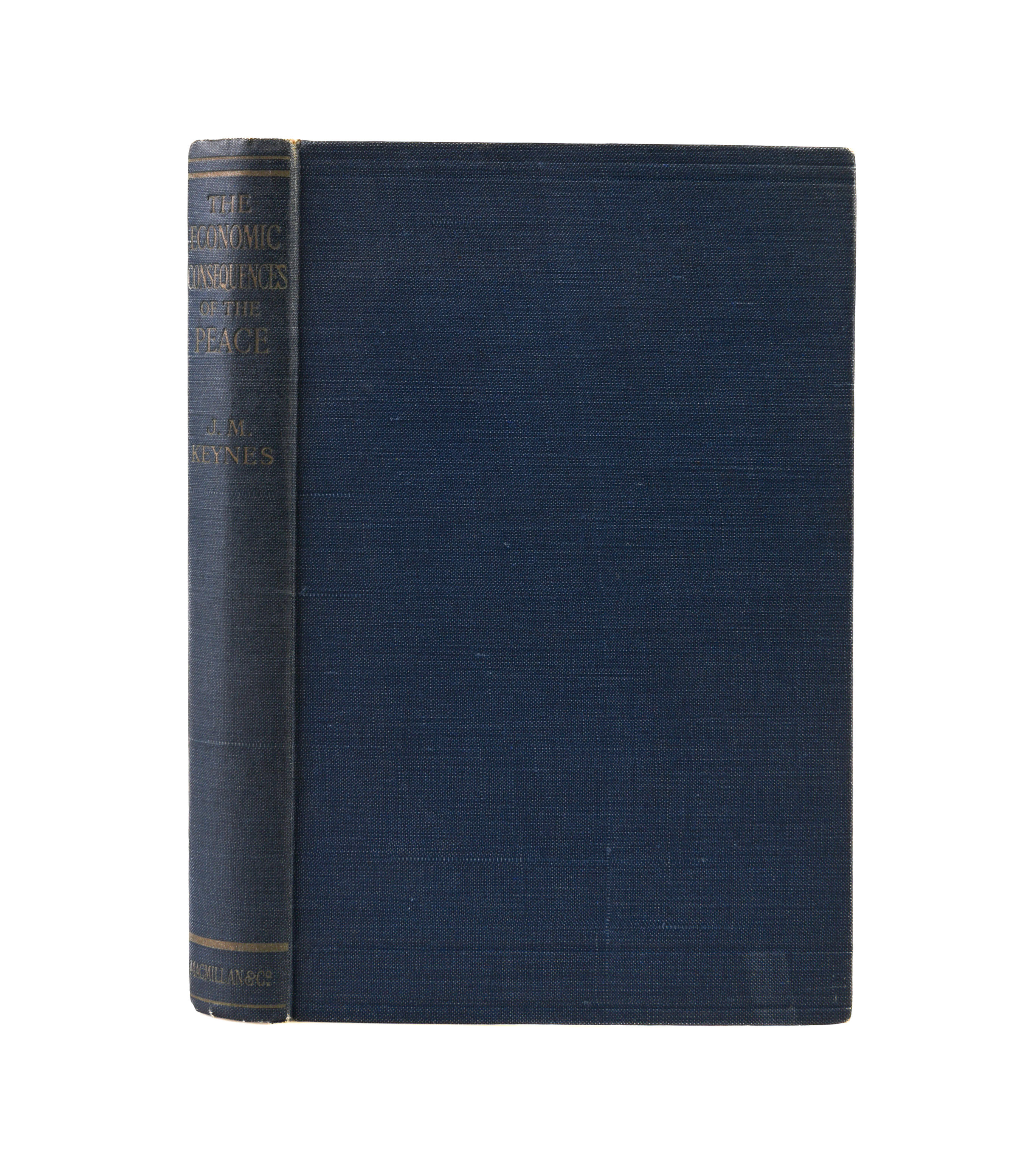Available Copies from Independent Booksellers

Keynes, John Maynard. The Economic Consquences of the Peace. MacMillan, London, 1919.
Price: US$644.13 + shipping
Condition: Good
Description: First impression. Size: 8vo 7 3/4 - 9 3/4". viii + 279pp. Text contains some pencil markings. Binding firm, spine cocked, slightly faded and worn. Small internal split to rear joint. Foxing front/rear pages, but body of book mostly clean and unfoxed. Edges browned and marked. Erased library markings. Covers slightly marked. Corners slightly bumped. Quantity Available: 1. Shipped Weight: Under 1 kilogram. Category: Economics; Modern; Military & Warfare. Pictures of this item not already displayed here available upon request. Inventory No: 50012.
Seller: Dreadnought Books, Bristol, United Kingdom

Keynes, John Maynard, C.B.. The Economic Consequences of the Peace. Macmillan Co, London, 1919.
Price: US$757.00 + shipping
Condition: Very Good
Description: Blue cloth with gilt lettering on spine, minor rubbing and wear to extremities, previous owner's name on first end paper, occasional pencil marks, otherwise clean with tight binding, 279 pages.
Seller: Book Grove, RMABA, Glenwood Springs, CO, U.S.A.

Keynes, John Maynard. The Economic Consequences of the Peace. Macmillan & Co, 1919.
Price: US$966.20 + shipping
Condition: Very Good
Description: London: Macmillan and Co., Limited, 1919 8vo., original blue publisher's cloth, ruled and lettered in gilt to spine; pp. [iv], v-vii, [i], 279, [i]; the cloth lightly rubbed to extremities, with minor loss of colour; upper edge a little dust soiled, with very faint evidence of a splash mark; previous pencil ownership inscription now erased from ffep, leaving mild depressions in the paper; a very good copy otherwise, sound in binding. First edition. Upon publication, the Economic Consequences created an intense and immediate controversy for its blatant criticism of both world leaders, and the Treaty of Versailles which ended the First World War. In his Preface, written while at King's College Cambridge in 1919, Keynes outlines the background for this important work on Economics. Attached to the British Treasury during the War, he was their official representative at the Paris Peace Conference, as well as being Deputy for the Chancellor of the Exchequer on the Supreme Economic Council, but resigned from both of these positions when the Terms of Peace were unable to be modified in accordance with his beliefs - despite his attempts to argue to the contrary. Keynes had hoped that such an agreement would establish the conditions for economic recovery, but was instead left dismayed as he observed world leaders focusing on borders, national security, and extracting large reparations from Germany. It quickly became a bestseller, with over 10,000 copies of various issues sold within a year of publication. Keynes' predictions - that as a blueprint for Peace, the treaty was destined to create tension and conflict - proved correct when another war broke out within a generation. Its subsequent popularity helped to cement his reputation as one of the 20th century's principle economists.
Seller: The Plantagenet King ABA / ILAB, Birchington, KENT, United Kingdom

Keynes, J.M. The Economic Consequences of the Peace.. Macmillan & Company, London, 1919.
Price: US$1250.00 + shipping
Description: First edition of the best-selling book that established Keynes' reputation as a leading economist. Octavo, original blue cloth with gilt titles and ruling to the spine. In near fine condition. The Economic Consequences of the Peace was written after Keynes attended the Versailles Conference as a delegate of the British Treasury and argued for a much more generous peace. It was a best-seller throughout the world and was critical in establishing a general opinion that the Versailles Treaty was a "Carthaginian peace". It helped to consolidate American public opinion against the treaty and involvement in the League of Nations. The perception by much of the British public that Germany had been treated unfairly in turn was a crucial factor in public support for appeasement. The success of the book established Keynes' reputation as a leading economist. When Keynes was a key player in establishing the Bretton Woods system in 1944, he remembered the lessons from Versailles as well as the Great Depression. The Marshall Plan after Second World War is a similar system to that proposed by Keynes in The Economic Consequences of the Peace. "The most important economic document relating to World War I and its aftermath" (John Kenneth Galbraith).
Seller: Raptis Rare Books, Palm Beach, FL, U.S.A.

Keynes, John Maynard. The Economic Consequences of the Peace. Macmillan and Co, London, 1919.
Price: US$1500.00 + shipping
Condition: Very Good
Description: First edition, first printing. Bound in publisher's navy blue cloth ruled in blind, with titles in gilt to spine; lacking the dust jacket. Very Good, with spine cloth worn at the extremities, with spine darkened and gilt barely legible. Corners bumped. Former owner name to front free endpaper causing offsetting to half-title page. Pages toned. A lovely copy of the first British edition, preceding the American edition which was first published in 1920.
Seller: Burnside Rare Books, ABAA, Portland, OR, U.S.A.

KEYNES John Maynard. The Economic Consequences of the Peace. , 1919.
Price: US$1610.33 + shipping
Description: First edition, first impression. 8vo. [8], 279, [1] pp. Original blue cloth, spine lettered and ruled in gilt, ruling continued to boards in blind (small contemporary ownership inscription to front free endpaper, faint offsetting to half title and verso of terminal leaf, otherwise internally clean; light shelf wear to tips of spine and corners, gilt lettering to spine slightly dulled, still an excellent copy overall). London, MacMillan & Co. The work that established Keynes' reputation as a leading economist and public intellectual, described by Keynes's biographer as 'one of the most influential books of the twentieth century' (Skidelsky, p. 384). In 1915 Keynes took up an official position at Whitehall and served as the principal representative of the British Treasury at the Peace Conference in 1919. 'He soon resigned, in protest against the terms imposed on the Central Powers, and rapidly produced The Economic Consequences of Peace, 1919. Even while the book was being written many of his prophecies came true and, in the light of subsequent history, the foresight of his conclusions would be uncanny did they not proceed so inevitably from his premises' (Printing and the Mind of Man, p. 254). Moggridge A2.1.1.
Seller: Maggs Bros. Ltd ABA, ILAB, PBFA, BA, London, United Kingdom

Price: US$1610.33 + shipping
Description: First edition, first impression, of Keynes's second book, which established his reputation as a political economist. Keynes's biographer called the book "one of the most influential books of the twentieth century" (Skidelsky, p. 384). The book comes from the library of the English novelist Alex Raban Waugh (1898-1981), with his bookplate on the front pastedown. Keynes resigned from his position as principal representative of the British Treasury at the Paris Peace Conference of 1919, in protest of the heavy reparations demanded from Germany. The Economic Consequences of the Peace was written directly afterwards as a condemnation of Allied policy: Keynes would continue arguing against the reparations in his 1922 book, A Revision of the Treaty. "The violence of the controversy aroused by these two books is now difficult to appreciate. Even while they were being written many of his prophecies came true and, in the light of the subsequent history, the foresight of his conclusions would be uncanny did they not proceed so inevitably from his premises" (PMM). Keynes's view, that the Treaty of Versailles was fundamentally unjust and threatened the peace and security of Europe, remains widely shared to this day. The brother of Evelyn Waugh, Alex Raban Waugh had a successful career as an author, publishing many works from 1917 to 1978 including poetry, novels, and short stories, as well as books on wine. He served at Passchendaele in the First World War, was captured by the Germans in March 1918, and spent the remainder of the conflict in prisoner-of-war camps in Karlsruhe and in the Mainz Citadel. Fundaburk 9981; Mattioli 1807; Moggridge A 2.1.1; Printing and the Mind of Man 423. Robert Skidelsky, John Maynard Keynes: Hopes Betrayed, 1983. Octavo. Original blue cloth, spine lettered in gilt. Spine sunned, rubbed at extremities, contents a little toned. A very good copy.
Seller: Peter Harrington. ABA/ ILAB., London, United Kingdom

Price: US$2415.49 + shipping
Description: First edition, first impression, of Keynes's second book, which established his reputation as a political economist; with "presentation copy" blindstamp to title page. Keynes's biographer called the book "one of the most influential books of the twentieth century" (Skidelsky, p. 384). Keynes resigned from his position as principal representative of the British Treasury at the Paris Peace Conference of 1919, in protest of the heavy reparations demanded from Germany. The Economic Consequences of the Peace was written directly afterwards as a condemnation of Allied policy: Keynes would continue arguing against the reparations in his 1922 book, A Revision of the Treaty. "The violence of the controversy aroused by these two books [Economic Consequences and Revision of the Treaty] is now difficult to appreciate. Even while they were being written many of his prophecies came true and, in the light of the subsequent history, the foresight of his conclusions would be uncanny did they not proceed so inevitably from his premises" (PMM). Keynes's view, that the Treaty of Versailles was fundamentally unjust and threatened the peace and security of Europe, remains widely shared to this day. Fundaburk 9981; Mattioli 1807; Moggridge A 2.1.1. Robert Skidelsky, John Maynard Keynes: Hopes Betrayed, 1983. Octavo. Original blue cloth, spine lettered in gilt. Spine dulled and worn at ends, endpapers and half-title toned, contents clean with a few page corners turned over. A good copy.
Seller: Peter Harrington. ABA/ ILAB., London, United Kingdom